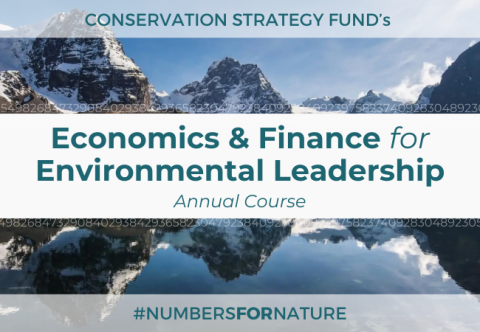
Read our full report on the 2024 course here.
From July 8th to September 12th, Conservation Strategy Fund (CSF) hosted it's 26th annual international Economics & Finance for Environmental Leadership course, curated for environmental professionals from government and the public sector, to NGOs, academia, the private sector and multilateral institutions around the world.
Participants covered a vast range of topics over the 10-week virtual course, beginning with market force, fundamentals in environmental and natural resource economics, exploring environmental policy, finding efficient conservation finance solutions, environmental valuation methods, and applications of cost-benefit analysis systems.
Format
The course was administered on the Numbers for Nature Training Institute platform, and was taught by CSF's staff of expert instructors through a combination of pre-recorded lecture material, online readings and resources, and virtual live sessions over zoom.
Virtual live sessions were held twice a week, including deepened discussions over course material with instructors and classmates, exercises, and interactive community board posts. Diverse approaches such as small and large group discussions, case-study explorations, learning games, and more were also included in these virtual live sessions to stimulate further learning and real life application in participant's respective fields.
The course ran for 10 weeks, with an estimated time commitment of 6-8 hours per week, including 2 virtual live sessions per week, pre-recorded lectures, and distributed readings and resources for class discussions. Seven modules were offered.
The seven modules covered a diverse range of topics, including:
Economic Fundamentals
- Fundamentals of economic and environmental economic concepts
- Return to the market basics: market failure, externalities, supply & demand, common resources, public goods
- Market Based environmental policies and solutions
Natural Resource Economics
- Application of economics towards policy decisions of extraction and conservation of natural resources
- Resource valuation, property rights, common property and resources
- Time value of money and capital theory
Environmental Policy
- Economists' view of environmental and resource problems in a market economy
- Market-based incentives for managing the environment and optimizing cost
- Command and control vs market-based instruments
- Categories of environmental policy (voluntary, command and control, market-based)
Conservation Finance
- Introduction and classification of conservation finance solutions
- Public and private sector finance options
- Economic instruments achieving financial efficiency and conservation goals
Environmental Valuation
- Natural capital and ecosystem health
- Economic tools to evaluate project development and conservation
- Importance of valuation and valuation methods
Cost-Benefit Analysis
- Use and fundamentals of cost-benefit analysis as a support tool
- CBA processes, calculating indicators and feasibility, risk and sensitivity analysis, and equity considerations
- Financial analysis vs. economic analysis
Behavioral Economics
- Neoclassical vs. behavioral economics
- Analysis of of consumer behavior and social + behavioral psychology
- Role of behavioral economics in policy design and everyday cases
Participants of this course gained:
- Foundational knowledge of economic concepts with environmental applications
- Lectures from renowned experts in environmental economics and conservation finance
- Expanded critical thinking for program development and project design
- A toolkit of economic analysis methods, including valuation and cost-benefit analysis
- An understanding of efficient policy decision-making towards conservation
- Utilization of market-based instruments towards environmental policy implementation
- Methods toward conservation solutions that are economically efficient
- An array of conservation finance solutions applying to the public sector, private sector, and multilateral institutions in participant's own work
- A network of environmental leaders within one's own cohort, and access to a network of nearly 5,000 CSF alumni in 131 countries representing 3,000 organizations.
Our 2024 annual course has concluded. Participants can learn more about our annual international course or our other courses on the Numbers for Nature (N4N) platform at www.numbersfornature.org.
Dry Creek Foundation
Dry Creek Foundation generously support CSF's training arm, Numbers for Nature, and the Numbers for Nature Training Institute platform.

